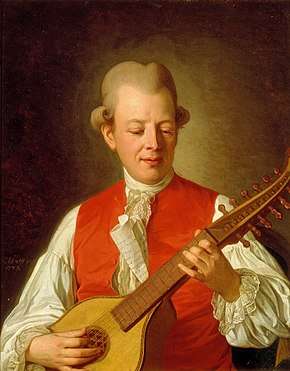Märk hur vår skugga
Märk hur vår skugga (Mark how our shadow) is one of the best-known of the 1790 Fredman's Epistles, where it is No. 81. These were written and performed by Carl Michael Bellman, the dominant figure in the Swedish song tradition. Its subject is the funeral of one of Bellman's female acquaintances, Grälmakar Löfberg's wife.
Context

Carl Michael Bellman is the central figure in Swedish song, known for his 1790 Fredman's Epistles and his 1791 Fredman's Songs. He played the cittern, accompanying himself as he performed his songs at the royal court.[1]
Jean Fredman is a fictional character and the supposed narrator in Bellman's epistles and songs, based on a real watchmaker of Bellman's Stockholm.[2] The epistles paint a picture of the demimonde life of the city during the eighteenth century, where strong drink and beautiful "nymphs" like Ulla Winblad create a rococo picture of life, blending classical allusion and pastoral description with harsh reality.[1][2]
Song
Epistle No. 81 is subtitled "Til Grälmakar Löfberg i Sterbhuset vid Danto bommen, diktad vid Grafven" (To Grälmakar/Quarrelsome Löfberg in the Hospice by the Danto barrier, dictated at the Grave). In addition it has a dedication, "Dedicerad til Doctor BLAD" (Dedicated to Doctor Blad/Leaf). The song has four verses, each of 9 lines.[3] The melody may be by Bellman himself; a very similar melody was used by Eric Lorentz Zebell, but it was printed after the Epistles.[4] The real Doctor Blad was the Bellman family's doctor, and one of their closest friends, during the latter part of Bellman's life.[5]
Recordings and translations
Epistle 81 has been recorded by Fred Åkerström and by Cornelis Vreeswijk.[6] Other versions have been recorded by Stefan Sundström and Imperiet, who scored a 1985-1985 Svensktoppen hit with the song. The English speaking band Mediaeval Baebes recorded the song in Swedish on their 2005 album Mirabilis.[7] The Swedish folk singer Sofia Karlsson included it in her 2007 album Visor från vinden, alongside works by poets such as Baudelaire and Dan Andersson.[8] The Danish metal band Evil Masquerade included the song, in Swedish, in their 2016 album The Outcast Hall of Fame.[9][10]
An English translation, entitled Epistle No. 81, has been recorded by the Swedish doom metal band Candlemass on the 1988 album Ancient Dreams, and by the American doom metal band While Heaven Wept on the 2003 album Of Empires Forlorn. Another English translation, entitled Castrum Doloris, was recorded by Swedish black metal band Marduk on the 2003 album World Funeral.[11]
References
- "Carl Michael Bellmans liv och verk. En minibiografi (The Life and Works of Carl Michael Bellman. A Short Biography)" (in Swedish). The Bellman Society. Retrieved 25 April 2015.
- Britten Austin, 1967. Pages 61–93.
- Bellman, 1790.
- Massengale, pages 204–205
- "Kommentar: No. 81". Bellman.net. Retrieved 19 April 2016.
- Hassler, page 284.
- Loftus, Johnny. "Mediæval Bæbes Mirabilis". Allmusic.com. Retrieved 17 March 2016.
- "Visor från vinden". Sonloco.com. Retrieved 13 May 2012.
- The Outcast Hall Of Fame album notes. Dark Minstrel Music. 2016. p. 11.
- "Evil Masquerade - The Outcast Hall of Fame - Encyclopaedia Metallum: The Metal Archives". metal-archives.com. Retrieved 13 July 2016./>
- Gunnar Sauermann: Marduk. Schweden, Tod & Teufel. In: Hard Rock & Metal Hammer, February 2003, p. 28.
Sources
- Bellman, Carl Michael (1790). Fredmans epistlar. Stockholm: By Royal Privilege.
- Britten Austin, Paul. The Life and Songs of Carl Michael Bellman: Genius of the Swedish Rococo. Allhem, Malmö American-Scandinavian Foundation, New York, 1967. ISBN 978-3-932759-00-0
- Britten Austin, Paul. Fredman's Epistles and Songs. Stockholm: Proprius, 1990 and 1999.
- Hassler, Göran; Peter Dahl (illus.) (1989). Bellman – en antologi [Bellman – an anthology]. En bok för alla. ISBN 91-7448-742-6. (contains the most popular Epistles and Songs, in Swedish, with sheet music)
- Hassler, Göran; Peter Dahl (illus.) (1989). Bellman II – en antologi [Bellman – an anthology]. En bok för alla. ISBN 91-7448-837-6.CS1 maint: multiple names: authors list (link) (contains the remaining Epistles and Songs, in Swedish, with sheet music)
- Kleveland, Åse; Svenolov Ehrén (illus.) (1984). Fredmans epistlar & sånger [The songs and epistles of Fredman]. Stockholm: Informationsförlaget. ISBN 91-7736-059-1.CS1 maint: multiple names: authors list (link) (with facsimiles of sheet music from first editions in 1790, 1791)
- Massengale, James Rhea (1979). The Musical-Poetic Method of Carl Michael Bellman. Stockholm: Almqvist & Wiksell International. ISBN 91-554-0849-4.
